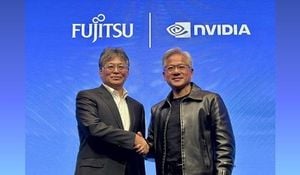The battle for talent within the rapidly evolving artificial intelligence (AI) sector is intensifying, with companies like Nvidia, Microsoft, and OpenAI locked in fierce competition for skilled employees. This fierce rivalry is marked by staggering salary offers, as firms attempt not just to attract the best minds but also to retain them amid significant layoffs and shifts within other tech giants.
Recently, Intel Corp announced it would be cutting around 20,000 jobs — more than 15% of its workforce — as part of restructuring efforts aimed at saving over $10 billion by 2025. While this plan is expected to align the company with market requirements, it has raised questions about the broader job market as other tech firms also navigate similar turmoil.
Despite the market's volatility, the AI field continues to boom, fueling salary escalations for many roles. For example, Intel's highest reported salary for its employees reached $263,000 annually for engineering managers. Data from 2022 shows various salary ranges at Intel, including:
- Business Intelligence Analysts: $65,437 to $142,438
- Information Security Analysts: $107,994 to $170,248
- Supply Chain Planning Analysts: $85,467 to $96,034
- Product Marketing Engineers: $102,606 to $150,093
- Mechanical Engineers: $81,765 to $121,576
- Data Scientists: $65,229 to $152,681
Even though these salaries are substantial, industry comparisons reveal Intel is potentially offering less attractive pay than its competitors. For example, Nvidia — which has seen extraordinary growth, particularly from AI advancements — offers salaries ranging from $74,460 to $786,000. This broad range is driven by their recent surge, primarily fueled by AI work.
Similarly, Microsoft’s salary offers ranged from $77,000 to $310,000, and OpenAI reported total compensation for its engineers averaging around $925,000 annually. These figures showcase how companies are willing to go to great lengths to secure top talent.
Apple and Alphabet (Google), two other tech heavyweights, also feature compelling salary packages. Apple’s offers for potential employees sit between $102,000 and $322,000, whereas Alphabet provides salaries ranging from $55,000 to $340,000.
While the numbers certainly paint a competitive picture, it’s critical to note these figures do not always encompass bonuses, stock options, and various performance incentives, which can dramatically increase overall compensation. Swirling misunderstandings or assumptions about the total worth of these packages can obscure the complete picture of employee benefits.
Salaries within the AI sector also reflect broader industry trends, impacting what individuals expect as both job offers and the industry as a whole. The fight for skilled workers is not merely about financial compensation; the allure of working with cutting-edge technologies and innovative projects plays equally critical roles.
What has become evident is the strategic movements within these firms highlight not just the push for improvement and efficiency but also how corporate identities are shifting to meet technological demands. With Intel's significant rounds of layoffs, there’s also speculation about how this might sway talent across the field, potentially leading to opportunities for companies actively pursuing skilled employees.
The AI job market is increasingly dynamic, inviting professionals across various technical disciplines. Various roles such as data scientists, machine learning engineers, and software developers find themselves at the forefront of this gold rush, fuelling innovation and growth across sectors.
Considering the current climate, it's not just numbers but the overall context of those numbers, along with the specific nature of positions and organizational culture, which can make all the difference when professionals make career moves. For many, the lure of working at the forefront of AI development and being part of groundbreaking projects may outshine merely higher pay.
With these trends shaping the AI sector, potential job seekers should keep their eyes peeled not just on salary but also on the potential for personal and professional growth, company vision, and the innovation level each organization embodies. The ultimate battle isn't only wages, it's about the future of technological evolution and the role new talents will play within it.
Experts believe this trend of vastly different salary scales could also lead to new recruitment methodologies. For example, instead of focusing solely on traditional hiring strategies, companies might explore more collaborative outreach programs to engage talent from diverse backgrounds and geographies.
This holistic approach might open pathways to not only capture diverse tech talent but also give companies the leverage needed to maintain rather than just attract those employees, especially as layoffs become commonplace across less agile organizations. It's about changing narratives — from jobs being cut to new jobs being created.
Going forward, observing the movements within these tech giants can provide insights on the overall economic climate, the evolving nature of job roles within AI, and the adaptations companies may need to make to attract and retain the necessary workforce. The future of the tech industry, especially AI, looks to be exciting with the right alignment of innovation, talent, and rewards.



